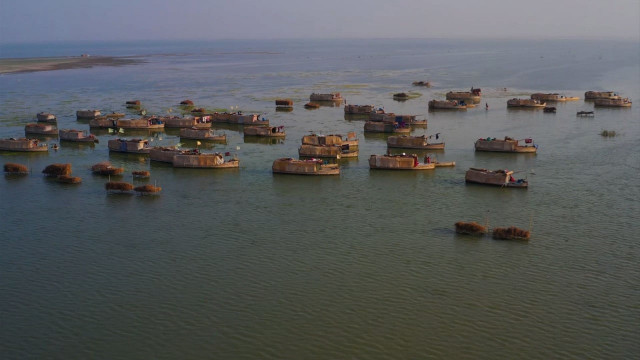Vanishing wetlands affect people, wildlife
Indus Delta fishermen, farmers suffer brunt of climate change

Shortage of water, climate change, vanishing wetlands and rise of temperature has made the lives of fishermen and farmers miserable.
Owing to the climate change phenomenon, rains are becoming uncertain, threat of droughts looming and summers getting hotter.
The people depending over fresh water living along the wetlands have suffered severely. Studies show that the melting glaciers provide 80 per cent of Indus River water. According to filmmaker Abdullah Khan, "Studies show that 28 per cent glaciers in Pakistan have vanished in the last 15 years."
He also pointed out that glaciers were melting rapidly. The film on 'Vanishing Wetlands', aired on Express TV on Sunday, disclosed how vanishing wetlands have adversely affected the wildlife and the lives people. The healthy wetlands nourish birds, including the migratory and resident birds.
They are also critical for human survival. During droughts the wetlands can replenish parched fields by releasing water from natural reservoirs. They can even filter out pollutants from the waste.
But more than anything wetlands are nature's nurseries, supporting 40 per cent of word's wildlife.
Haji Ahmed, one the fishermen of Manchhar Lake, said that his family has been living in the lake for seven generations. "Our forefathers used to sail these boats. They were born and grown up here.
Before we didn't have any worries. We had everything in past," he narrated. Fishermen, commonly known as Mohana, have their lifestyle and culture linked with this profession for over 5,000 years.
Basheer Mallah, another man said that: "We slept, worked, married and did everything on the boat houses. Our lives were free of stress. We used to grow vegetables here. Fishermen never bothered with grains crops." The Manchhar Lake is one of the biggest lakes in the region but drastic changes have taken place in the lake affecting the local mohanas. Polluted water released into the lake has destroyed them.
"The water [polluted] is now so poisonous. It devastates everything. Our happiness is gone," Basheer Mallah said. Basheer said that the life of fishermen are very hard and sad now. Ahmed said that the water in the lake comes from Indus River.
"Now, that flow has been dammed." He said that the size of the fish has reduced. "How can we make a living from that?" he questioned. He also complained that the fresh water for them was a precious commodity.
"One container of drinking water cots Rs40. How can we pay for that? We have no other option but to drink this polluted water," he said. The industrial effluent and illegal fishing is also responsible for this loss. Pakistan is one of the water scared countries. But the country still has 19 Ramsar sites which are wetlands of great importance. Every year over a million of birds pass through the Indus flyway.
The Indus River after an epic journey of 3,000 km finally reaches the Arabian Sea, splitting into a massive delta that has sustained wildlife and people for thousands of years. Indus Delta The life in the Indus Delta is not ideal for the fishermen and the farmers. Ghulam Mohammad, who lives near the Delta said: "The Indus River has run a natural system for thousands of years by changing its path and direction it gives life to the land." He said that all the crops grown there shine like the river Sindh.
"I don't think there is any plant that doesn't flourish here. The secret ingredient of all this beauty comes from the Indus River. The soil is seeped with the aroma of faraway places along the river Sindh.
" He is of the views that the human development has collided with the nature. "Now we are facing the consequences. Water scarcity, the lack of rains, a rise in temperature that risen in just the past 15 years. Before there was nothing like that," he mentioned. He said that farmers were growing large crops of betel leaf in the area. "Its ideal growing temperature is 25 degrees centigrade.
" He said that because of rising temperature, the crop of betel leaf was vanishing." The perturbed farmer said that much of the Sindh's water is channeled into canals. He said that when fresh water stops flowing downstream, the Arabian Sea floods in. "That's why so many acres of land have become barren," he said. "Other areas are now infertile because salt water has seeped in from underground."
Also reminding, he said: "When our elders tell us that they once grew rice and fruit. We find it hard to believe." Almost 1.2 million people have already migrated from shrinking Indus River Delta to Karachi. And thousands of mohanas have abandoned their ancient floating villages. Abdullah said that the film also aims to portray the beauty of the nature. He said that the wetland supports 40 per cent of wildlife. "We need to tell what kind of threats they are facing," he urged.
He also said that it was difficult for him as a filmmaker to find the animals. Sharing the details, WWF-Pakistan's Jamshed said that '2005 se 2012 Pakistan wetlands programmes' was launched that aimed at focusing on restoration, conservation and preservation of the wetlands of Pakistan. He said that the biodiversity was good at Manchhar Lake.
"Pollution is one of the reasons of the destruction of Manchhar Lake," he said. Abdullah also said that fishermen were facing issues as they did not get enough fish from the water. "Farming is also disturbed," he added.

1638179476-1/WhatsApp-Image-2021-11-29-at-2-18-06-PM-(1)1638179476-1.webp)



















COMMENTS
Comments are moderated and generally will be posted if they are on-topic and not abusive.
For more information, please see our Comments FAQ